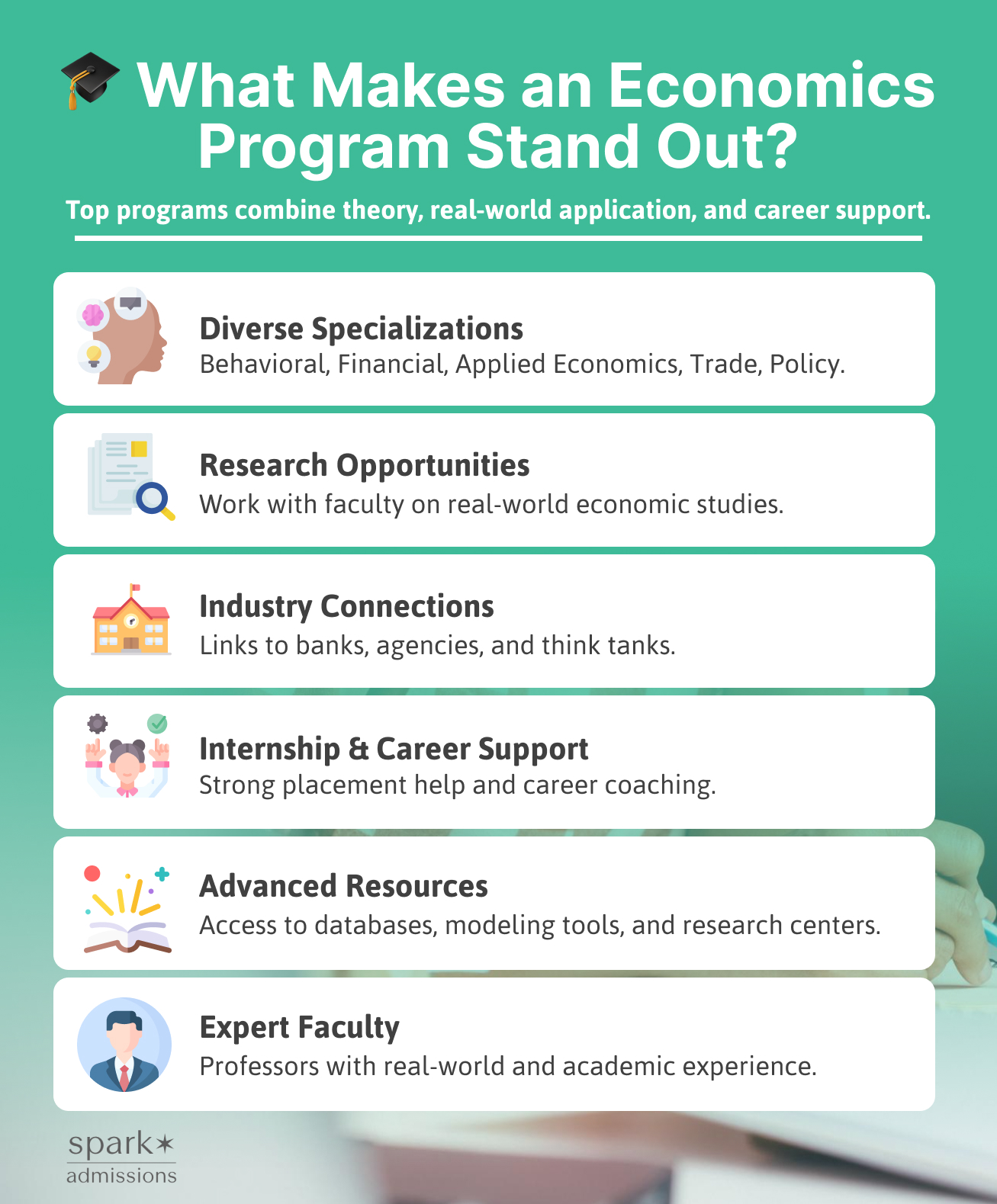- Blog
- > Best Schools
Best Economics Schools for a Top-Tier Education
- Dr. Rachel Rubin
- | April 8, 2025

Choosing where to study economics isn’t just about rankings; it’s about finding the right fit for your academic ambitions, career goals, and personal growth. The best economics schools provide a strong foundation in economic theory, quantitative analysis, and real-world application.
These schools open doors to lucrative career paths in finance, data science, government, and beyond. From Harvard University to Stanford University, these institutions stand out for their cutting-edge research, exceptional faculty, and unparalleled networking opportunities.

What Makes an Economics Program Stand Out?
Not all economics programs are created equal. The strongest ones provide a well-rounded curriculum, opportunities for hands-on research, and access to top-tier faculty. These programs help students develop the analytical, quantitative, and critical thinking skills necessary for success in various career paths.
Variety
One key factor that sets top economics programs apart is the ability to specialize in different fields. Many leading universities offer concentrations in areas such as behavioral economics, applied economics, financial policy, public policy, international trade, and economic development. These specializations allow students to tailor their education to align with their career goals.
Research
Another major advantage of a strong economics program is the opportunity for hands-on research and real-world application. Many top schools offer research assistant positions where students work alongside faculty on cutting-edge economic studies. These experiences are particularly valuable for those considering graduate school or careers in academia, as they help develop essential skills in data analysis, statistical modeling, and economic forecasting.
Networking
Beyond coursework and research, leading economics programs provide strong industry connections and internship opportunities. Universities with established relationships with major financial institutions, government agencies, and economic think tanks give students a head start in securing internships and job placements. Networking events, guest lectures, and mentorship programs further enhance students’ professional development.
Unmatched Resources
Top economics programs often feature state-of-the-art resources such as dedicated research centers, access to proprietary economic databases, and advanced statistical software. These tools allow students to conduct in-depth analysis and gain hands-on experience with the same technology used by industry professionals.
Key features of a standout economics program include:
- Diverse Specializations: Programs that offer tracks in behavioral economics, financial policy, international trade, and applied economics.
- Hands-On Research Opportunities: Positions as research assistants and access to faculty-led projects.
- Industry Connections: Strong ties to financial institutions, government agencies, and consulting firms.
- Internships and Job Placement Support: Career services that help students secure internships and full-time employment.
- Advanced Resources and Technology: Access to economic databases, financial modeling software, and dedicated research centers.
- Renowned Faculty: Professors with industry experience and academic expertise in key economic fields.
Top-Ranked Economics Schools
Harvard University
Harvard’s economics department consistently ranks among the best in the world. With a faculty that includes Nobel laureates and industry experts, the undergraduate economics program offers a deep dive into microeconomics, macroeconomics, and applied statistics. Harvard also provides substantial financial aid, making it accessible to students from diverse backgrounds.
Stanford University
Stanford’s economics program places a strong emphasis on data-driven decision-making and economic policy. Students interested in technology, investment banking, or entrepreneurship will find Stanford an excellent choice due to its close ties with Silicon Valley. The university also offers research assistantships for undergraduate and graduate students, providing hands-on experience in economic studies.
Princeton University
Princeton’s undergraduate economics program focuses on both theoretical and applied economics. Students engage in research projects, studying issues such as income inequality and economic development. The department also provides financial support for students pursuing doctoral studies or graduate-level research.
University of California, Berkeley
Berkeley’s economics department is known for its strength in applied economics and public policy. The program offers extensive coursework in multivariate calculus, linear algebra, and advanced statistical methods. Graduate students benefit from numerous research opportunities, while undergraduates receive rigorous training that prepares them for competitive graduate programs or high-level careers in finance and consulting.
Columbia University
Columbia’s economics major provides a solid foundation in economic theory and quantitative analysis. The university’s location in New York City makes it ideal for students interested in finance, investment banking, or public policy. Many students secure internships with major financial institutions, gaining valuable industry experience while still in school.

Career Prospects for Economics Majors
Earning a degree in economics opens doors to a wide range of careers, spanning finance, consulting, government, and academia. The analytical and problem-solving skills developed in an economics program are highly valued across industries, making this degree a versatile and lucrative choice.
Entry-Level Opportunities and Salaries
Graduates with a bachelor’s degree in economics can explore roles such as financial analyst, data analyst, policy analyst, research assistant, and market analyst. According to the U.S. Bureau of Labor Statistics (BLS), financial analysts earn a median annual salary of around $96,000, while market research analysts earn approximately $68,000. Entry-level economists working for government agencies or private firms can expect salaries starting at $60,000 to $75,000, depending on location and industry.
Mid-Career and Advanced Roles
With experience and possibly further education, economics majors can move into senior positions with significantly higher earning potential. Professionals in investment banking, management consulting, or corporate strategy can earn well over six figures, with salaries often exceeding $150,000. Economists working in government agencies or research institutions can earn between $100,000 and $130,000, particularly in policy-driven roles.
Advanced Degrees and Specializations
Pursuing a master’s or doctoral degree in economics can lead to specialized, high-paying roles in academia, economic forecasting, international trade, and financial regulation. Those with a Ph.D. often work as university professors or lead research teams, with median salaries of around $120,000. Data scientists and quantitative analysts, who apply advanced statistical modeling to economics and finance, can command salaries exceeding $140,000 in top-tier firms.
Emerging Fields and New Opportunities
As data analytics, artificial intelligence, and digital finance continue to evolve, economics graduates are finding opportunities in fintech, behavioral economics, and machine learning applications. Companies seek professionals who can analyze economic trends and develop predictive models, offering salaries that can reach $150,000 or more for those with expertise in programming and data science.
Overall, an economics degree provides a strong foundation for a variety of career paths. Whether entering the job market with a bachelor’s degree or continuing to graduate studies, students can expect competitive salaries and opportunities for professional growth in diverse industries.
Have Your Pick of the Best Economics Schools
Selecting the right economics school is a personal decision that depends on several factors, including academic interests, career aspirations, and financial aid options. The best schools provide not only strong academics but also opportunities for hands-on research, internships, and networking with industry professionals. With the right education, students can develop the skills needed to make meaningful contributions to economic policy, business strategy, and global financial systems.
Ready to get into one of the best economics schools? Spark Admissions has the highest college admissions success rate in the country. Contact us today to see how our expert consulting services can help you craft a standout application and achieve your academic goals!

